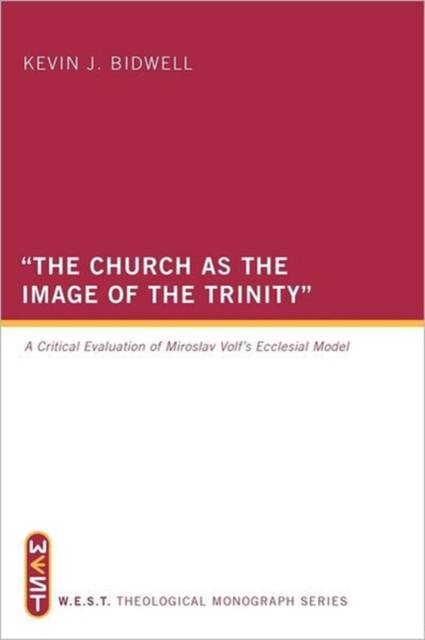
- Retrait gratuit dans votre magasin Club
- 7.000.000 titres dans notre catalogue
- Payer en toute sécurité
- Toujours un magasin près de chez vous
- Retrait gratuit dans votre magasin Club
- 7.000.0000 titres dans notre catalogue
- Payer en toute sécurité
- Toujours un magasin près de chez vous
The Church as the Image of the Trinity
A Critical Evaluation of Miroslav Volf's Ecclesial Model
Kevin J Bidwell
49,95 €
+ 99 points
Format
Description
A resurgence of Trinitarian interest gained momentum in the twentieth century and it is showing little sign of abating in the twenty-first century. This research endeavors to critically evaluate Miroslav Volf's ecclesial model for "the church as the image of the Trinity," one that he presents with the English title, After Our Likeness. Volf proposes a social doctrine of the Trinity, one that is heavily influenced by the theological writings of Jurgen Moltmann, and he puts forward that this nonhierarchical Trinity should be reflected in the structures and theology of the church. If Volf is correct, then a radical reshaping is needed for the church to conform to an egalitarian pattern, one that is "after the likeness" (Gen 1:26) of an egalitarian God. In this critical examination, Kevin J. Bidwell begins by stating the theological influences that are pertinent to Volf's thesis in After Our Likeness and the assumptions that undergird and inform his whole theological paradigm. An important theological excursus is offered to assess the theology of John Smyth, the first English Baptist, who is Volf's representative figure for the location of his own ecclesiology, the Free Church. A critical analysis follows of Volf's engagement with his two chosen dialogue partners who represent both Western and Eastern theological traditions: Joseph Ratzinger and John D. Zizioulas. Volf presents five theses for "the church as the image of the Trinity," which could be labeled as Volf's Free Church in the image of Volf's revised doctrine of the Trinity. This monograph offers extensive insight into the contemporary debate on the doctrine of the Trinity, but it also assesses many aspects of ecclesiology from both Eastern and Western perspectives.
Spécifications
Parties prenantes
- Auteur(s) :
- Editeur:
Contenu
- Nombre de pages :
- 280
- Langue:
- Anglais
- Collection :
- Tome:
- n° 1
Caractéristiques
- EAN:
- 9781610973731
- Date de parution :
- 10-06-11
- Format:
- Livre broché
- Format numérique:
- Trade paperback (VS)
- Dimensions :
- 152 mm x 226 mm
- Poids :
- 408 g

Les avis
Nous publions uniquement les avis qui respectent les conditions requises. Consultez nos conditions pour les avis.






